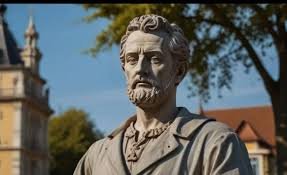Heinrich Servias Germany 1555 may not be a name that frequently surfaces in contemporary historical discussions. Yet, his influence on 16th-century Germany is undeniably significant. Servais’s life and contributions offer a fascinating glimpse into an era marked by transformative societal and cultural changes. From modest beginnings to becoming a pivotal figure of his time, Heinrich Servais embodies the innovative spirit and intellectual vigor that characterized the Renaissance period.
Table of Contents
ToggleHeinrich Servais: An Insight into 16th-Century German Context

Heinrich Servais’s journey provides invaluable insights into the broader landscape of 16th-century Germany. This period was characterized by intellectual fervor, religious upheaval, and the quest for knowledge that transcended traditional boundaries. The challenges faced by Servais mirrored those of his contemporaries, making his story emblematic of an era marked by change and discovery.
Although historical records on Servais’s specific contributions are limited, his life offers a snapshot of the underappreciated figures who quietly influenced their time. The significance of his work extends beyond his lifetime, reflecting the contributions of countless individuals who shaped the Renaissance in their own ways. Revisiting Servais’s life allows us to appreciate the enduring effects of his endeavors in an era of dynamic transformation.
Shaping the Renaissance through Innovation and Learning
Born in Germany in 1555, Heinrich Servais was part of a vibrant cultural and intellectual milieu that profoundly influenced his development. Growing up during the Renaissance—a time when medieval customs gave way to the seeds of modernity—Servais experienced firsthand the dramatic shift towards innovation and critical thinking.
From an early age, he displayed a strong passion for knowledge, breaking free from the limitations of conventional education. His diverse education encompassed philosophy, science, art, and mechanics, which laid the foundation for his multifaceted impact on German society. Servais’s innovative mindset, coupled with his pursuit of knowledge, positioned him as a key figure in the intellectual evolution of 16th-century Germany.
A Revolutionary Mind in 16th-Century Germany

Heinrich Servais emerged as a revolutionary thinker, challenging established norms and advocating for intellectual inquiry. His influence extended beyond academic circles, as he championed the principles of education, reasoning, and freedom of thought. During an era when superstition often overshadowed reason, Servais promoted critical thinking, igniting debates that reshaped societal perspectives.
In the realms of art and science, Servais’s impact was equally significant. He fostered creativity, contributing to cultural movements that would help define German identity. His advocacy for innovation in governance and personal liberty promoted collaboration among diverse communities, setting the stage for future advancements in European intellectual thought.
Bridging Science, Art, and Philosophy
Heinrich Servais’s legacy in 16th-century Germany is intertwined with the Renaissance spirit of bridging various fields of study. Though comprehensive records of his professional activities are sparse, Servais was known for integrating scientific exploration with philosophical inquiry. His work in mechanical engineering, though not fully preserved, laid the groundwork for early machinery that revolutionized industrial processes.
As a passionate patron of the arts, Servais recognized the profound impact of creative expression on human perception. He supported artists and thinkers, contributing to the flourishing of a vibrant German art scene. His philosophical musings on the relationship between science, technology, and society provided a holistic approach to understanding progress, demonstrating an awareness of the ethical dimensions of technological advancements.
The Cultural and Intellectual Landscape of 16th-Century Germany

Germany in the 16th century was a hub of cultural, intellectual, and religious change. The Renaissance, Reformation, and the rise of printing transformed the German-speaking regions, introducing new ideas in literature, science, and the arts. Figures like Albrecht Dürer and Johannes Gutenberg emerged, leaving an indelible mark on history.
Though not directly linked to these specific advancements, Servais was undoubtedly influenced by this dynamic intellectual environment. The printing press facilitated the rapid dissemination of innovative ideas, fostering an atmosphere where traditional beliefs were continuously questioned and refined. This cultural milieu shaped Servais’s own thoughts and contributions, aligning him with the broader shifts in 16th-century Germany.
A Renaissance Scholar and Community Advocate
Heinrich Servais’s contributions extended beyond scholarly pursuits. Renowned for his advancements in philosophy and theology, his writings sparked debates and influenced contemporary thought. Beyond academia, Servais actively engaged in community development, advocating for educational reforms that laid the groundwork for future public education initiatives.
His commitment to social progress underscored a vision for an enlightened society. Servais’s legacy as a community advocate demonstrates the breadth of his influence, showcasing how intellectual achievements can resonate with and shape society at large.
Reflecting the Turbulent 16th Century

Servais’s life unfolded during a tumultuous period in German history, marked by religious conflict, political fragmentation, and cultural transformation. While details about his personal life are limited, his story offers insight into the era’s broader historical dynamics.
Navigating through a period of intense upheaval, Servais contributed to the intellectual and cultural shifts defining his time. His legacy reflects the broader challenges and changes of 16th-century Germany, emphasizing the role of individual experiences in shaping history.
A Renaissance Innovator and Cultural Influencer
Heinrich Servais stands out as a cultural influencer in Renaissance Germany. His innovative approach and willingness to challenge conventional wisdom set him apart. His interactions with prominent intellectuals of his era enriched his work and deepened his impact on German culture.
Driven by curiosity and a commitment to exploration, Servais’s endeavors left an enduring mark on the cultural fabric of his time. His life embodies the intellectual shifts and vibrancy of the 16th century, offering a rich legacy for future generations.
Unraveling the Legacy of Heinrich Servais’s Family Tree

Servais’s lineage provides a window into the cultural transformations of 16th-century Germany. His family tree reflects a blend of nobility and resilience, exemplifying the broader shifts occurring during this transformative period.
Exploring his ancestry reveals how familial bonds and values shaped identity and heritage. The Servais family’s experiences influenced their surroundings and contributed to German history, highlighting the interplay between personal legacy and national evolution.
The Servais Family: A Reflection of 16th-Century German History
In 1555, Germany was amidst religious upheaval and societal change. The Servais family adeptly navigated this era of transformation, contributing to their communities and establishing traditions that influenced future generations.
Their story is a testament to resilience and adaptability, themes prevalent in German history. Understanding the Servais family’s experiences provides insights into how individual lineages shape and contribute to national identity.
The Challenges and Significance of Studying Heinrich Servais

Researching figures like Heinrich Servias Germany 1555 is challenging due to limited historical records. The 16th century’s less meticulous record-keeping resulted in the loss of many documents, complicating efforts to fully understand his life and contributions.
However, this scarcity of records underscores the importance of exploring the broader historical context. By examining the cultural and intellectual environment of his time, we gain insights into Servais’s impact and significance, even if the finer details remain elusive.
The Value of Exploring Historical Figures Like Heinrich Servais

Studying historical figures like Heinrich Servais enriches our understanding of the past. It provides a glimpse into the lives of those who navigated pivotal events, revealing the broader impact of historical changes on society. By delving into Servais’s life, we connect more personally with history, appreciating the human experiences that have shaped our present and future.
Final Words
Heinrich Servias Germany 1555, a compelling figure of 16th-century Germany, embodies the dynamic changes of his time. His legacy, intertwined with the broader historical narrative, offers valuable insights into the human condition and societal progress. Although records of his achievements may be scarce, his influence on intellectual, cultural, and community spheres underscores the often-overlooked stories that shape history. Reflecting on Servais’s life enhances our understanding of the transformative forces that defined an era, enriching our appreciation for the complexity and diversity of human experience.
Frequently Asked Questions (FAQs)
Q1: Who was Heinrich Servais in 16th-century Germany?
A: Heinrich Servias Germany 1555 was a notable figure in 16th-century Germany known for his contributions to the intellectual, cultural, and philosophical developments of his time. Though specific historical records about his life are limited, his influence on various fields, such as education, art, and science, reflects the broader transformative spirit of the Renaissance.
Q2: Why is Heinrich Servais important to German history?
A: Heinrich Servais represents the spirit of innovation and intellectual inquiry characteristic of the Renaissance in Germany. His contributions, particularly in promoting education, critical thinking, and cultural development, highlight the impact of individuals in shaping societal progress during a period of significant change.
Q3: What were Heinrich Servais’s main contributions?
A: Heinrich Servais’s main contributions spanned various domains, including philosophy, science, art, and community development. He advocated for education, fostered cultural movements, and participated in scientific and philosophical discourse, leaving a lasting mark on the intellectual landscape of his era.
Q4: What challenges are faced in studying Heinrich Servais’s life and legacy?
A: The primary challenge in studying Heinrich Servais’s life is the scarcity of detailed historical records from the 16th century. Limited documentation from that period makes it difficult to construct a comprehensive picture of his achievements. Researchers must rely on broader historical context and available writings to understand his impact.
Q5: How did Heinrich Servais influence the cultural movements of his time?
A: Heinrich Servais influenced cultural movements by fostering creativity and supporting the arts. His patronage contributed to a vibrant art scene in Germany, promoting local artists and enhancing the cultural fabric of the period. Additionally, his philosophical ideas on the intersection of science, art, and society further shaped cultural development.
Q6: What was the intellectual climate of Germany during Heinrich Servais’s time?
A: Germany in the 16th century experienced a dynamic intellectual climate driven by the Renaissance, Reformation, and the invention of the printing press. This period was marked by significant advancements in science, art, philosophy, and literature, creating an environment where traditional beliefs were questioned and new ideas flourished.
Q7: Is there a direct link between Heinrich Servais and prominent figures like Albrecht Dürer or Johannes Gutenberg?
A: While there is no direct historical evidence linking Heinrich Servais to specific figures like Albrecht Dürer or Johannes Gutenberg, it is plausible that he was influenced by the intellectual environment they helped create. The dissemination of knowledge through the printing press likely shaped his thoughts and contributions to the cultural landscape of 16th-century Germany.
Q8: How did Heinrich Servais’s family background influence his legacy?
A: Heinrich Servias Germany 1555 came from a lineage that was deeply involved in the societal changes of 16th-century Germany. His family’s engagement in their community and their influence on local culture helped shape his perspectives, highlighting the broader impact of familial heritage on personal and societal evolution.
Q9: What makes studying historical figures like Heinrich Servais valuable today?
A: Heinrich Servias Germany 1555 figures like Heinrich Servais enriches our understanding of the past and how individual contributions have shaped society. It helps us connect with historical narratives on a personal level and appreciate the complexity of intellectual and cultural developments across time.
Q10: What is known about Heinrich Servais’s philosophical views?
A: Heinrich Servias Germany 1555 is known for exploring the interplay between science, art, and philosophy. He emphasized the ethical dimensions of technological progress and the importance of integrating scientific inquiry with philosophical reflection. His writings delved into human nature, knowledge, and societal advancement, influencing contemporary thought.
Read More: Order Tartan Plaid Fabric – Ideal For Fashion and Decor Projects




